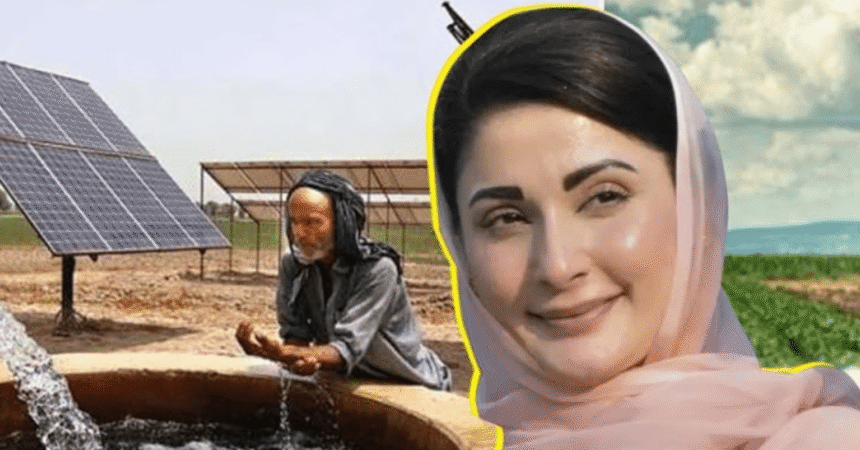In a progressive move towards sustainable agriculture and efficient water management, the Punjab government has announced its decision to solarize 7,500 tubewells by June of the next year. This initiative reflects a commitment to modernizing agricultural practices, enhancing productivity, and addressing energy challenges in the province. The announcement was made during a Planning and Development Board meeting chaired by Chief Minister Maryam Nawaz in Lahore, where various measures were discussed to support agricultural growth and improve public services.
Understanding the Initiative
The Need for Solarization
Punjab, being the agricultural heartland of Pakistan, heavily relies on tubewells for irrigation. Traditional energy sources for these tubewells, primarily electricity and diesel, have become increasingly expensive and unreliable, leading to higher operational costs for farmers. Solarizing tubewells presents a viable solution to reduce these costs, ensuring a sustainable and uninterrupted water supply for crops.
Solar energy is abundant and renewable, making it an ideal alternative for powering agricultural machinery. By harnessing solar power, farmers can significantly decrease their dependence on fossil fuels, leading to cost savings and environmental benefits. This shift is particularly crucial in the context of climate change, where sustainable practices are essential for long-term agricultural viability.
Objectives of the Solarization Program
The primary objectives of the solarization initiative include:
- Reducing Energy Costs: By transitioning to solar power, farmers can cut down on their energy expenses, thereby increasing their profit margins.
- Enhancing Irrigation Efficiency: Reliable access to water will improve crop yields and enable farmers to adopt better agricultural practices.
- Promoting Sustainable Agriculture: The program aligns with global efforts to reduce carbon footprints and promote environmentally friendly farming practices.
- Boosting Economic Growth: A more efficient agricultural sector can contribute to economic growth by increasing production and exports.
Details of the Meeting
Key Discussions
During the Planning and Development Board meeting, several critical topics were addressed:
- Solarizing Tubewells: The decision to solarize 7,500 tubewells was a significant agenda item. The Chief Minister expressed optimism about the project, stating that it would not only benefit farmers but also contribute to the province’s overall energy sustainability.
- Increasing Agricultural Exports: The meeting reviewed measures to enhance the export of agricultural produce. As the global demand for food rises, it is crucial for Punjab to capitalize on its agricultural strengths.
- Chief Minister Agriculture Graduate Programme: A new initiative was proposed to appoint agriculture graduates in Union Councils. This program aims to leverage modern agricultural knowledge at the local level, ensuring that farmers receive updated information and techniques.
- Cultivation of Canola: The government discussed increasing canola cultivation to diversify crops and reduce reliance on imports. Utilizing government land for this purpose could lead to enhanced agricultural productivity.
- Kisan Cards: The distribution of Kisan cards to farmers was highlighted, with over 35,000 cards issued so far. These cards facilitate access to credit and agricultural inputs, empowering farmers to improve their productivity.
- Green Tractors Initiative: The approval for the design and procurement of 9,509 green tractors marked another step towards modernizing Punjab’s agricultural machinery. These tractors are specifically designed to enhance agricultural efficiency.
- Emergency Medical Services: The Chief Minister emphasized the importance of enhancing healthcare infrastructure, including the establishment of airstrips for air ambulance services and the provision of rescue ambulances in every city.
- Expansion of Rescue Training: Plans for expanding rescue training at universities and colleges were discussed, aiming to build a capable workforce for emergency response.
Significance of the Decisions
Each of these initiatives plays a crucial role in shaping the future of agriculture and public health in Punjab. The solarization of tubewells is not just an energy-saving measure; it symbolizes a broader commitment to sustainability and innovation in agricultural practices.
The Broader Impact on Agriculture
Economic Implications
The agricultural sector is a significant contributor to Punjab’s economy. By improving irrigation efficiency through solarization, the government is likely to see increased agricultural output, leading to enhanced food security and economic stability. As production increases, the potential for export growth also rises, benefiting both farmers and the provincial economy.
Environmental Considerations
Transitioning to solar energy reduces greenhouse gas emissions and promotes environmental sustainability. By adopting solar-powered tubewells, Punjab can take a significant step toward combating climate change, protecting its natural resources, and preserving the environment for future generations.
Empowering Farmers
The initiative empowers farmers by providing them with the tools and resources necessary for success. Reduced energy costs and improved irrigation systems can lead to increased crop yields, ultimately improving farmers’ livelihoods. Furthermore, the distribution of Kisan cards and the introduction of the Chief Minister Agriculture Graduate Programme are designed to ensure that farmers receive the support and guidance they need to thrive in a competitive market.
Challenges and Considerations
While the solarization initiative offers numerous benefits, several challenges must be addressed to ensure its successful implementation:
Financial Constraints
The initial investment required for solarizing tubewells may be a barrier for some farmers. To mitigate this, the government could explore partnerships with financial institutions to provide low-interest loans or subsidies for farmers looking to transition to solar power.
Technical Training
Implementing solar technology requires technical expertise. The government must ensure that adequate training programs are available for farmers to understand how to operate and maintain solar-powered tubewells effectively.
Infrastructure Development
The success of the solarization initiative will depend on the availability of supportive infrastructure. This includes reliable supply chains for solar panels and associated equipment, as well as maintenance services to ensure the longevity of the installations.
Public Awareness
Raising awareness about the benefits of solar energy and the solarization program is crucial. Farmers must understand how solar power can enhance their operations and contribute to their overall success.
Enhancing Agricultural Exports
Addressing Export Challenges
Increasing agricultural exports is vital for Punjab’s economic growth. However, several challenges must be addressed:
- Quality Standards: Ensuring that agricultural products meet international quality standards is essential for gaining access to global markets. This may require investments in processing facilities and quality assurance mechanisms.
- Market Access: Establishing trade agreements and reducing barriers to entry in foreign markets can enhance export opportunities for Punjab’s agricultural products.
- Infrastructure Improvements: Improving transportation and logistics infrastructure is crucial for facilitating the movement of goods to international markets. This includes upgrading roads, storage facilities, and ports.
Strategic Initiatives
To support agricultural exports, the Punjab government can implement various strategic initiatives:
- Market Research: Conducting market research to identify demand trends and preferences in target markets can help farmers tailor their production accordingly.
- Promotion and Branding: Developing a strong brand for Punjab’s agricultural products can enhance visibility and desirability in international markets.
- Export Training: Providing training for farmers on export procedures, packaging, and marketing can empower them to engage successfully in international trade.
Conclusion
The Punjab government’s decision to solarize 7,500 tubewells is a transformative initiative that reflects a commitment to sustainable agriculture, economic growth, and public welfare. By harnessing solar energy, the province can enhance its agricultural productivity, reduce energy costs, and promote environmental sustainability.
In conjunction with this initiative, the government’s focus on increasing agricultural exports, empowering farmers, and improving emergency services demonstrates a comprehensive approach to addressing the multifaceted challenges facing the province. As these initiatives unfold, they hold the potential to reshape the agricultural landscape of Punjab, fostering a more resilient and prosperous future for its farmers and citizens alike.
The journey toward sustainable agriculture and enhanced public services is complex, but with strategic planning, adequate funding, and community engagement, Punjab can lead the way in agricultural innovation and development in Pakistan.
#PunjabGovernment #SolarEnergy #SustainableAgriculture #KisanCards #AgriculturalExports #PublicHealth #ChiefMinister #MaryamNawaz #GreenTractors #EconomicGrowth







